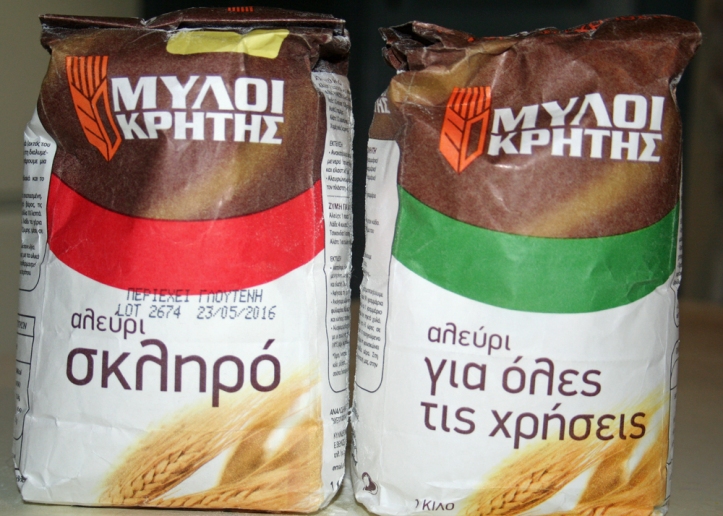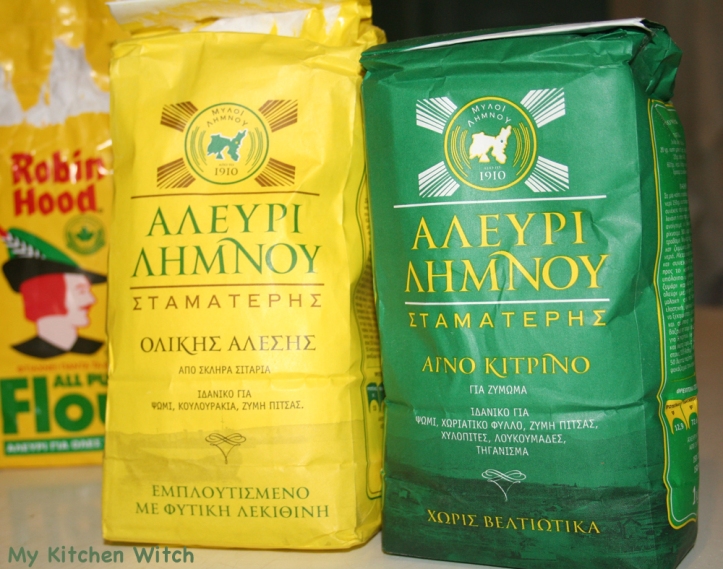Recently, I’ve had to shift to different flours in my bread making. Our small local grocery store indicated that it could no longer source the Canadian brand, Robin Hood flour that I mentioned in a previous post, written at a time when we first arrived in Greece. It dawned on me that this development was, no doubt, a consequence of the Capital Control measures put in place here in Greece last year. Basically (if you will forgive the simplification), Capital Controls restrict the flow of money outside of Greece in a move to support the country’s banking system, which is in everybody’s interest. As a consequence, payments by retailers in Greece to suppliers outside Greece have become difficult.
However, I can still readily source flour from Crete – the brand Μύλοι Κρήτης (Mills of Crete). The company began in 1928 in Souda Bay in the western part of the island near the major town of Chania. Although the mill was destroyed during WWII, it was rebuilt and modernised in the 1950s. Since then, the company has gone from strength to strength, diversifying into such things as cheese production (for which Crete is famous) and animal feed (using only raw plant foods that have not been genetically modified), becoming one of the largest companies on the island. It has also become one of the major flour producers in Greece with a milling capacity about 450 tonnes of flour per day. Both their hard (σκληρό) and basic all-purpose flour (για όλες τις χρήσεις) are perfect for making superb sourdough bread loaves.
And I have discovered really lovely flour from the island of Limnos – white, semolina (or “pure yellow” as it is labeled) and wholegrain (ολικής αλέσης). All of these flours make fantastic bread – great elasticity and wonderful flavour. I particularly like the semolina for baguette baking. According to the packets, the company has been producing flour since 1910. Unlike Μύλοι Κρήτης, it appears to be a small company with limited production. From what I have read, in Classical times, the island of Limnos (located in the Northeast Aegean and also spelled Lemnos), was known as the Athenian granary, having been controlled by that city-state. Jumping forward a few centuries, the island supplied wheat to the imperial Byzantium court at Constantinople. In later historic times, windmills dotted the landscape evidence for its production of flour during Ottoman and early modern times. It is nice to see that quality flour is still produced today on the island.
Flour procurement, however, is simply one small example of a larger issue. During a dinner party we hosted, conversation turned to the topic of local (Greek) companies filling the gap in supplying a variety of produce on the supermarket shelves, giving those companies a much needed boost. It was also mentioned that, in some instances, a few (primarily small) producers who had been forced to shut down because of the recent financial crisis, were now operating again. Although this is primarily hearsay, dinner table talk, it makes certain sense. And, if true, it is an unexpected – and positive – consequence for the country’s economy in what is surely a difficult time for Greece.
It has brought home to me that one should always, in the first instance, source local produce. It is not only a case of freshness, better taste, or even reducing the “carbon footprint”, but it has ramifications for many more things as well.


Debi, I agree entirely. How much better can that imported flour be? I bet it is not even as good as the local stuff. Good on you for buying local.
LikeLiked by 1 person
Hi Glenda, I certainly noticed a better tasting bread when using local flour. I think this global economy has us all bamboozled into thinking that things like Canadian flour (a strong gluten-rich wheat and probably genetically modified) is better, cheaper, and somehow more consistent in performance than local. To use another antiquarian word – balderdash!
LikeLike
I am less and less a fan of the global economy. I don’t see the need for food to be flown half way around the world.
LikeLiked by 1 person
One of the neatest things about living abroad – making that kind of discovery.
LikeLike
Yes, I totally agree with you. It would be very boring if we saw the same stuff in any supermarket across the globe. I am finding lots of other sources for local flour in the big open market in Central Athens – and having fun doing it.
LikeLike
Great food for thought KW. I am conscious of food miles particularly with fruit and veg and am trying to mirror that with other purchases. With varying success. (Hello Maldon Salt, I am looking at you…he he…)
LikeLiked by 1 person
In my local supermarket in the UK, they print the “carbon footprint” (i.e. distance from source) on fresh produce, so one can have the choice of buying something like fresh trout caught a few miles away or tilapia fillets that are shipped in from NZ. Too bad, because I like tilapia. The good news is that Maldon salt is a UK salt! But, the sea salt here in Greece is equally marvellous (given all that sea around), though Himalayan pink salt seems to have a certain cachet among the cooks here. Odd, but true.
LikeLiked by 1 person
I agree wholeheartedly. Why buy foreign stuff when the local product is just as good if not better, not to mention the importance of supporting the local economy and the issues of freshness. I tend to apply this rule to all things here in Australia except for Parmigiano (Reggiano or Grana Padano) which must be the imported product for me, even though a version is made here, as well as Kefolograviera and an occasional splurge on a slab of French butter).
LikeLiked by 2 people
Ditto with Stilton. I have visitors from the UK bring it out. Italy is so close that Parmesan seems *almost* local. Generally buying local does not preclude you from a few good ingredients and specialities from further afield. It is the mega manufacturers of staple products who ship their goods in bulk around the world, undercutting local manufacturers, that are the real culprits.
LikeLiked by 1 person
True.
LikeLike
Very interesting, your experience with the flour and your comments explain the situation in Greece a lot more than the news reports. So good that local businesses are being boosted 🙂
LikeLiked by 1 person
Hi Elaine, I find that many news articles tend to sensationalise things, but there is always a kernel of truth lurking in there. Yes, there are people – many of them pensioners – in dire straits here as a consequence of the financial situation, but I try to find the positive. Every little bit helps, even if it is simply choosing local produce rather than imported goods.
LikeLike
My main reason for buying local is that spending money locally keeps the money in the community and so we all profit. Sometimes that means a ten mile radius, sometimes it encompasses the UK. I no longer buy rice or foreign cheeses because I’d rather buy British equivalents. Luckily Maldon is just down the road from me, so no problems with salt!
LikeLike
Local is a flexible term – so yes, when I am in the UK, I tend to buy products from Yorkshire or Derbyshire, or generally within the UK (including Maldon salt – lucky you, being just down the road). Finding good quality Greek produce is more difficult if you aren’t familiar with the brands or can’t chat with the market stall holders (my Greek is basic enough for me to ask for a specific thing or failing that, I point). However, I am learning!
LikeLike
I make every effort to keep food miles to a minimum too, but I make exceptions for industries that survive at the expense of the enviroment, like the Aussie rice industry. It’s hard to trust labelling. There seem to be loopholes that are exploited to the max, like berries labelled Produce of NZ when in fact they have been imported from China and repackaged in NZ.
LikeLiked by 1 person
So many things to take into account if we want to shop ethically! Those loopholes should be nipped – but, then other ways around the system will be devised. Sad, but I think it is true. And, I agree that crops should be grown in environments suited for them, not manipulating environments to suit the crop. Tinkering with the eco-system is dangerous with untold ramifications that sometimes affect us years and years later.
LikeLike
Great post, many thanks!
LikeLike
I so agree with buying local and supporting our local economy.
Womenlivinglifeafter50.com
LikeLiked by 1 person
Thanks, Sue. I always knew buying local was a good thing, but this flour incident has really opened my eyes to how it affects the local/regional economy.
LikeLike